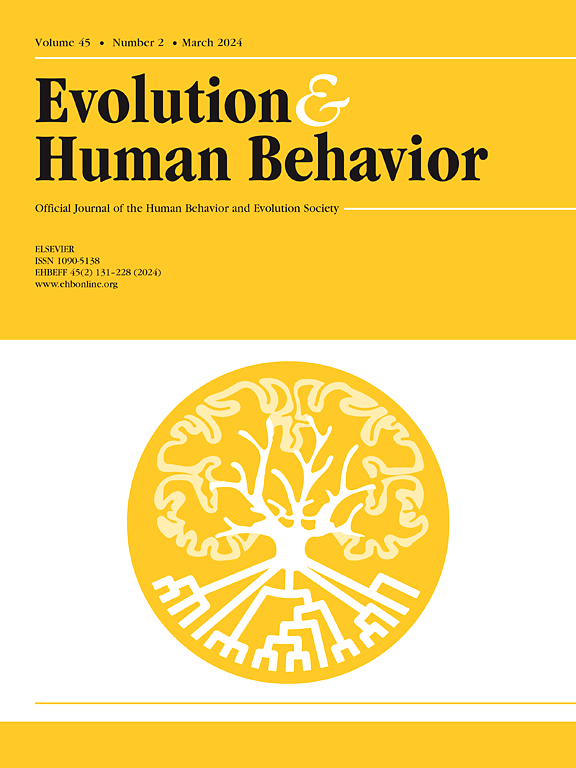在交配方面,男性(而非女性)更喜欢生活在经济平等的社会中:五项研究调查
IF 3.2
1区 心理学
Q1 BEHAVIORAL SCIENCES
引用次数: 0
摘要
人们普遍认为,人们更喜欢经济平等的社会。迄今为止,还没有研究系统地考察过这种偏好的性别差异,特别是在交配--一个重要的人生阶段--方面。基于交配策略的理论框架(即hypergyny),我们假设,在交配方面,男性比女性更不倾向于选择和居住在高度不平等的社会中。这可能是因为经济不平等的环境导致男性对婚后生活质量的预期低于女性。这些假设通过采用混合方法的五项研究得到了证实。具体而言,我们首先以育龄人口为研究对象,利用 2006 年至 2019 年美国 50 个州的面板数据(研究 1A)、美国县一级的最新横截面数据(研究 1B)以及美国居民个人移民记录的大规模调查数据(N = 4,746,718, 研究 2)提供了证据。此外,我们还通过操纵交配动机(研究 3)和经济不平等程度(高与低,研究 3 和研究 4,N = 812,N = 418)进行了两次对照实验。我们的研究既采用了生态有效性较高的档案数据,也采用了可进行因果推论的实验证据,结果表明男性比女性对经济不平等表现出更强烈的厌恶。我们的研究结果有助于加深对进化交配策略和性别差异如何共同影响经济不平等偏好的理解。本文章由计算机程序翻译,如有差异,请以英文原文为准。
Men (but not women) prefer to live in economically equal societies when it comes to mating: A five-study investigation
It is generally believed that people prefer societies with economic equality. No studies thus far have systematically examined sex differences in this preference specifically concerning mating—an important life stage. Building upon theoretical frameworks of mating strategies (i.e., hypergyny), we hypothesized that men, in comparison to women, are less inclined to prefer and reside in a highly unequal society when it comes to mating. This could be because economically unequal environments lead men to expect poorer life quality after marriage than women. These hypotheses were confirmed across five studies using a mixed-method approach. In particular, we first provided evidence by focusing on fertile age populations and employing the panel data across 50 states of the USA from 2006 to 2019 (Study 1A), the most recent cross-sectional data at the county level of the USA (Study 1B), and a large-scale survey data on the individual migration records of American residents (N = 4,746,718, Study 2). In addition, we conducted two controlled experiments by manipulating mating motivation (Study 3) and economic inequality level (high versus low, Studies 3 and 4, N = 812, N = 418). Our studies, employing both archival data high in ecological validity and experimental evidence allowing causal inferences, show that men exhibit a stronger aversion than women toward economic inequality. Our findings contribute to a deeper understanding of how evolutionary mating strategies and sex differences jointly influence the economic inequality preference.
求助全文
通过发布文献求助,成功后即可免费获取论文全文。
去求助
来源期刊

Evolution and Human Behavior
生物-行为科学
CiteScore
8.30
自引率
9.80%
发文量
62
审稿时长
82 days
期刊介绍:
Evolution and Human Behavior is an interdisciplinary journal, presenting research reports and theory in which evolutionary perspectives are brought to bear on the study of human behavior. It is primarily a scientific journal, but submissions from scholars in the humanities are also encouraged. Papers reporting on theoretical and empirical work on other species will be welcome if their relevance to the human animal is apparent.
 求助内容:
求助内容: 应助结果提醒方式:
应助结果提醒方式:


